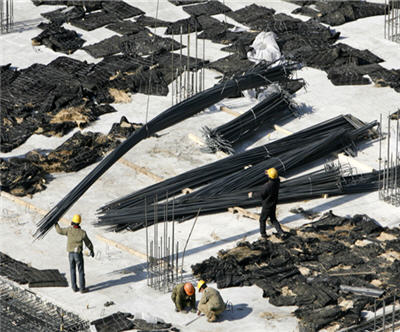Iron ore price hits fresh 8-month low

The benchmark import price of 62% iron ore fines at China’s Tianjin port on Monday declined to $117.70 a tonne, down more than 12% since the start of the year and the lowest since July 1 2013.
The globe’s most active steel future – Shanghai rebar – was languishing near the record low of Rmb3,295 ($540) per tonne reached last week.
The crisis in China’s steel industry, responsible for 48% of global output, deepened last week as pollution engulfing the northern parts of China stayed near record levels and authorities forced smaller steel mills in the affected provinces to idle plants.
The Chinese government, fearing too great reliance on imports, has artificially boosted domestic production of iron ore by by restricting small blast furnaces’ access to high-quality imports.
But this has only exacerbated the pollution problem, an item which is likely to be high on the agenda ahead of the Chinese parliamentary gathering starting on Wednesday.
The hundreds of small-scale Chinese mines last year produced more than 1.4 billion tonnes of ore.
At the same time quality has slid from more than 30% iron content a decade ago to just 21.5% in 2013, increasing the need for pollution-creating sintering and adding to costs.
Which is why the country’s large steel mills have been opting to buy high-quality ore from Australia, Brazil and South Africa.
But this ore have been piling up at the country’s ports, reaching 102.7 million tonnes on Monday, up 1.8 million from the previous week.
This is because China’s steel output is rapidly declining amid a fall-off in end-user demand.
During the most recent 10-day reporting period crude steel production decreased 4.8% to just over 1.96 million tonnes per day from a peak of more than 2.2 million in 2013 and stockpiles jumped 5.7% to a new record high according to the China Iron and Steel Association.
CISA remains optimistic in its outlook however, predicting imports to rise 50 million tonnes from the record-breaking 820 million tonnes imported last year.
CISA also projects 2014 crude-steel output in China to rise about 3% to 815 million tonnes (a big jump from the annualized rate of 718 million tonnes using the latest data), an all-time high after more than 30 years of unbridled growth.
The world’s biggest miners which have become increasingly reliant on iron ore for the bulk of their profits, need a fast growing China.
Supply from the rest of the world is ramping up and predictions of a market surplus this year has climbed to as much as 90 million tonnes.
Image of construction workers in Beijing by Loic.Hofstedt
{{ commodity.name }}
{{ post.title }}
{{ post.date }}




Comments